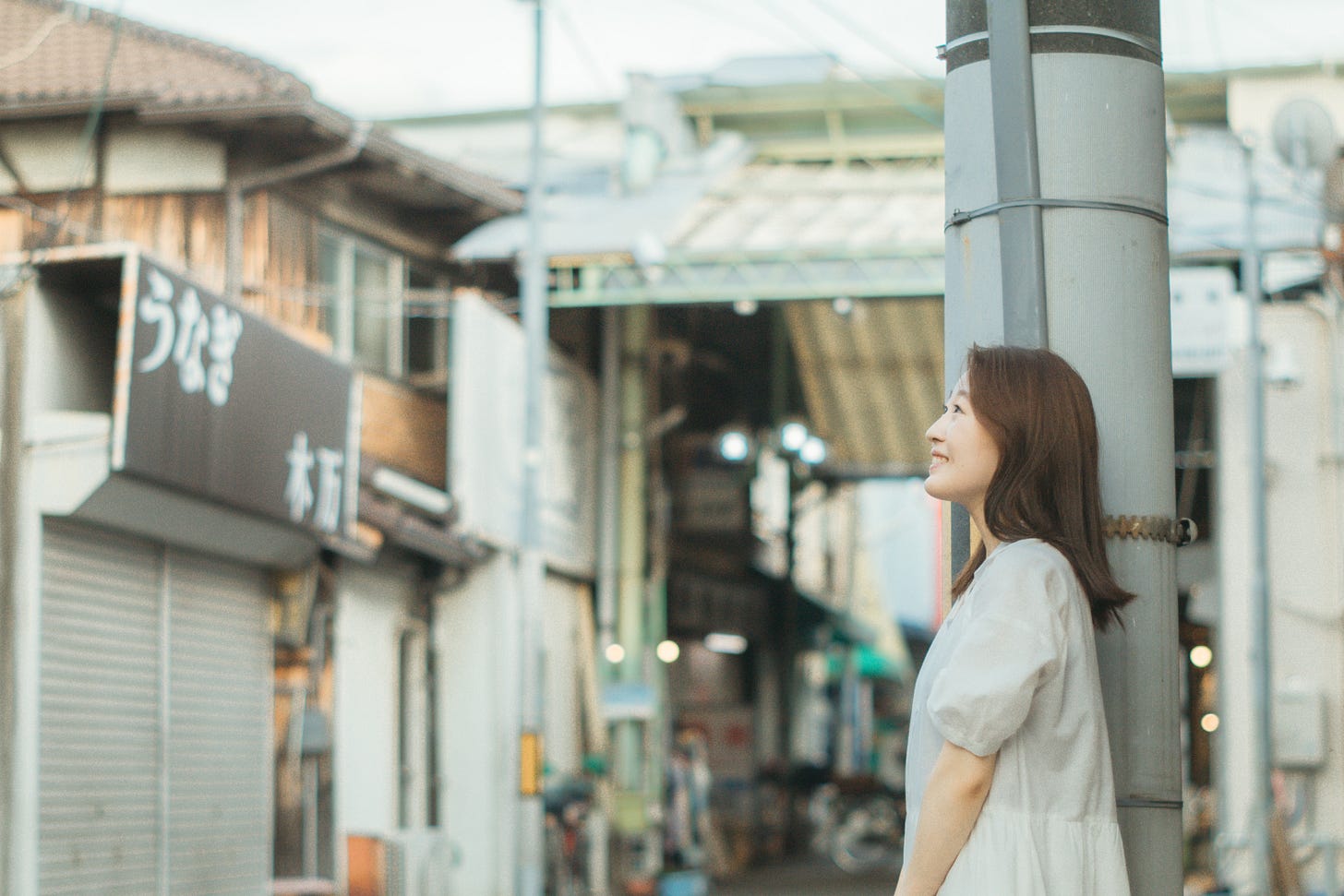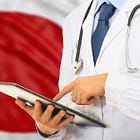Health, Wellness & Japan – Why a Japanese Medical Student Started This Newsletter
I Turned 24 Last Week!
I had a huge exam yesterday, so I couldn’t post this earlier, but now that it’s over, I want to share something important with you—why I started Substack.
You might think, why is a medical student writing about Japan? The short answer: I want to help people save their lives.
That might sound overwhelming, but let me explain. It might be a little long, but I hope this will help you understand who I am and what I want to do.
Who I Am
My name is Miki.
I was born and raised in Osaka, Japan, where I lived for 17 years before moving abroad. Now, I’m a 6th-year medical student in Hungary, soon to be licensed in the EU, US, and Japan.
But long before I got here, my journey into medicine started with something much more personal—years of debilitating migraines.
Living with Severe Migraines
Ever since middle school, I suffered from frequent migraines with aura. At least twice a week, I had to rush to the school nurse’s office, asking her to turn off the lights and keep quiet because even the slightest noise or brightness made my pain unbearable.
I went to countless hospitals specializing in migraines. Every doctor gave me a long list of possible causes—hormones, diet, sleep, stress, weather. But no one could pinpoint the exact trigger.
As I was writing my migraine diary every day, I eventually understood what was causing my migraines. Now, I can cope well and experience them much less. But ever since this experience, I thought I wanted to become a medical doctor specializing in migraines, because I knew how frustrating it was to suffer from a chronic condition that disrupted daily life.
I was especially interested in research—I always believed that research, more than a hospital-based medical career, had the potential to help far more people.
In high school, I was researching about the relationship between migraines and glutamate, and I genuinely enjoyed it. That experience made me even more convinced that I wanted to become a researcher.
Why I Chose Hungary
I initially considered studying in the US since I thought the US was the best place for medical research, but the costs were far too high, and the medical track takes at least eight years to become a doctor.
So I looked for the fastest and most affordable way to get there. That’s how I ended up in Hungary. It was the fastest way to get my medical license in the EU, US, and Japan.
Why I Entered—and Left—Medical Research
I entered medical school as planned and joined a research team early on. It was a natural step toward my goal of becoming a migraine specialist.
But after a year in research, I realized it wasn’t what I had envisioned.
Unlike high school experiments, where small mistakes were forgiven, university-level research was relentless. I spent five hours perfecting the smallest details, only to have a minor oversight ruin everything. It was exhausting.
I respect researchers deeply, but I realized that I thrive in environments where I can see immediate impact and progress—which research rarely provides. So, I walked away.
Discovering Startups: A New Way to Save Lives
At the end of my third year, a friend introduced me to the world of healthcare startups. Until then, my life was a cycle of medical textbooks, 15-hour study days, and exams. But working with a startup helping patients with skin conditions opened my eyes:
I saw firsthand how one innovative service could change thousands of lives. Patients told me how the app helped them monitor their skin diseases, reducing unnecessary doctor visits.
This made me think: What if I could save lives not just one by one in a hospital, but at scale?
Starting Something of My Own
I wanted to create something that I truly cared about. But at the same time, I experienced something that hugely changed my perspective.
A Personal Loss That Changed Everything
During my medical studies, I lost my grandfather.
He seemed healthy, but while I was studying in Hungary, I got a call: he had cancer. By the time they found it, it was too late. He hadn’t been getting preventive checkups—which could have caught the disease earlier.
At the same time, my clinical training showed me a harsh reality.
I learned that even if you want to save a patient, sometimes, if the diagnosis comes too late, you can’t help them. I kept thinking, what if this patient had been diagnosed earlier?
Of course, doctors working in hospitals are crucial. But I realized I had something more I could do—what if I helped people prevent disease through early diagnosis and daily preventive care?
Then, in terms of preventive health, I realized that Japan, where I was raised, is an amazing place for this. That’s when I thought—what if I could do something related to Japan and health?
Why This Newsletter?
The biggest reason why I started Substack is for you to visit Japan and experience a wellness-focused, health-conscious trip—one that impacts not just your time in Japan but your long-term health afterward.
I believe there are many reasons why Japanese people live long lives. (I’m planning to write a dedicated newsletter on this soon, so if you're interested, subscribe and stay tuned!)
But for now, here are the three biggest factors that I think is important:
1. Food
Japanese food emphasizes balance and nutrient density. The traditional washoku diet is rich in seasonal vegetables, fermented foods, and lean proteins, which help prevent lifestyle diseases.
2. Wellness Activities
From onsen (hot springs) to forest bathing (shinrin-yoku) and daily walking habits, wellness is built into Japanese culture.
3. Healthcare System
Japan’s universal health insurance and preventive health culture make it easier to seek medical care. While insurance may not apply to you as a tourist, you can experience Japan’s biggest preventive health service: Ningen Dock—a comprehensive health checkup that detects diseases early. If you're interested, check out the details here!
The Road Ahead
This newsletter is just my first step toward a much bigger vision. Right now, I’m focused on two things:
Helping people plan wellness-focused trips to Japan
Japan is not just Tokyo, Kyoto, and Osaka. There are so many hidden wellness destinations, but very little information in English. I help travelers find and experience Japan’s lesser-known health and wellness spots.
Helping people get Ningen Dock, Japan’s advanced preventive health checkup
From registration to day-of support and translation of results, I guide people through the entire process. Many hospitals in Japan don’t speak English, so as a soon-to-be licensed doctor in Japan, the EU, and the US, I can be the bridge between foreign patients and Japan’s top-tier healthcare system.
For both services, I offer a free 30-minute consultation and discounted Ningen Dock support for paid subscribers.
But these are just the first steps. Looking ahead, I want to make an even bigger impact—not just through this newsletter, but through real-life experiences that change the way people think about travel, health, and longevity.
My Goals as a 24-Year-Old
This year, I have two main focuses: growing this platform and expanding my ability to help people experience Japan’s wellness culture firsthand.
For Substack
Create high-quality content about Japan’s hidden wellness gems and longevity secrets
Offer detailed itineraries and deep wellness insights for paid subscribers
Reach 10,000 subscribers by the end of this year
For My Business
Help 100 people take a wellness trip to Japan
Help 100 people experience Ningen Dock
Fully fund a trip to Japan for someone who has always dreamed of visiting
I know these are ambitious goals, but I truly believe that wellness shouldn’t be limited to where you live. By making Japan’s best health experiences more accessible, I want to help people take control of their health in ways they never thought possible.
Thank You for Reading
Thank you for reading until the end—it means a lot to me! I hope my passion for preventive health resonated with you.
If it did, please like, comment, and share as a birthday present for my 24th!
I’d also love to hear what topics you’d like me to write about. (Thank you to those who have already messaged me!)
If you're planning a trip to Japan and want to explore wellness destinations or experience Ningen Dock, feel free to reach out!




This is inspiring and interesting! I wish you the best!
However, I feel like it should also be taken into account that although the health rates are good, the happiness and reproduction rates in Japan are concerning (amongst the lowest of the world). This gets me thinking: why in a country, that is so progressive and preserving wellness traditions so well, do people not feel happy? Health and happiness aren’t separate, they are connected, because physical as well as mental health are connected.
I have ongoing discussions on this with my Japanese acupuncture master and people who live or lived there for a long time, and I’d like to read more on this from your perspective as well. It’s easy for us foreigners to be blindsided by the stunning geography and culture of Japan, but for the good of the people, this must be investigated from many perspectives in the future!
I hope to learn more.
Amazing mission. Looking forward to learning more.